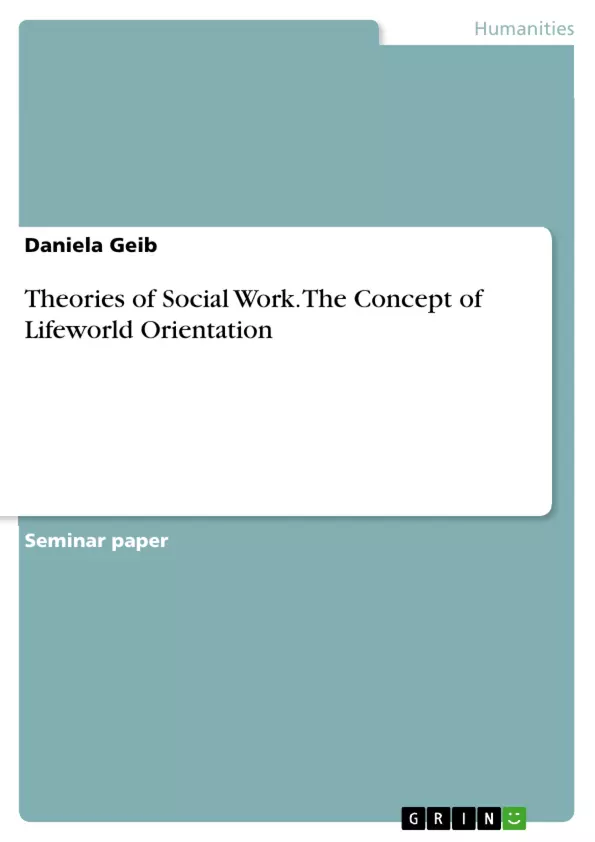Scientists and academics are repeatedly confronted with questions about the theories on which their work is based. Especially in relation to the relationship between theory and practice, the question arises as to what extent and whether theories are necessary at all in social work. To put it bluntly, the raison d'être of social work as a science and course of study at universities is also called into question here. If theories are not needed at all, why should social work be represented as a science at universities?
In this paper, I would therefore first like to deal with the concept of theory. Even though a general definition of the concept of theory in terms of scientific theory is difficult due to its complexity, an attempt will be made here to arrive at an initial understanding of the concept of theory. Based on this, we will then ask for criteria or definitions of theories of social work. The second part of this paper will then deal with a theory or a concept in the context of social work by way of example. The first question is about the basic assumptions of the concept of lifeworld orientation, its lines of tradition and its development. This is followed by a presentation of the dimensions represented within the concept of lifeworld orientation as well as the structural and action maxims on which lifeworld-oriented social work is based. Finally, before a brief concluding remark, the previously explained concept of lifeworld-oriented social work will be concretised using the example of social-pedagogical family assistance.
Table of Contents
- Introduction to the topic
- Introduction
- Attempts to determine a definition
- The concept of theory
- Theories of Social Work
- The concept of life-world orientation
- Basic assumptions
- Traditional lines
- Development of life-world orientation
- Five accesses
- Dimensions of life-world orientation
- Structural and hand-oriented social work
- Life-world-oriented social work in practice using the example of socio-educational family assistance
- Concluding remarks
Objectives and Key Themes
The objective of this work is to explore the concept of theory in social work, focusing specifically on the concept of life-world orientation. The paper aims to define the role of theory in the practice of social work and examine how it contributes to the scientific understanding of the field. It also seeks to analyze how the concept of life-world orientation can be applied in real-world social work practice.
- The role of theory in social work
- The definition and significance of the concept of life-world orientation
- The practical application of life-world-oriented social work
- The relationship between theory and practice in social work
- The scientific and disciplinary identity of social work
Chapter Summaries
- Introduction to the topic: This chapter introduces the relevance of theoretical understanding in social work, particularly the ongoing debate about the practical value of theories. It highlights the question of whether theories are essential to the field and explores the relationship between theory and practice. The chapter further introduces the concept of theory and its criteria, setting the stage for the subsequent discussion of life-world orientation.
- The concept of life-world orientation: This chapter delves into the basic assumptions, historical development, and various dimensions of the life-world orientation concept. It examines the framework upon which life-world-oriented social work is built, exploring its structural and action principles.
- Life-world-oriented social work in practice using the example of socio-educational family assistance: This chapter applies the theoretical framework of life-world orientation to a specific practical example – socio-educational family assistance. It demonstrates how the principles of life-world orientation can be implemented in a real-world social work setting.
Keywords
This work focuses on key concepts such as theory, social work, life-world orientation, practice, theory-practice relationship, scientific character, disciplinary identity, and socio-educational family assistance. These terms represent the core themes and research foci of the paper, providing a comprehensive understanding of the field and its theoretical underpinnings.
Frequently Asked Questions
Why is the role of theory important in social work?
Theories provide the scientific foundation for social work, justifying its status as an academic discipline and guiding professional practice through structured frameworks.
What is the concept of lifeworld orientation?
Lifeworld orientation is a theoretical framework in social work that focuses on the everyday reality and subjective experiences of individuals to provide more effective support.
How does lifeworld-oriented social work apply to family assistance?
In socio-educational family assistance, it means working within the family's actual environment, respecting their routines, and building on their existing strengths and social contexts.
What are the structural and action maxims of this concept?
These are guiding principles, such as prevention, decentralization, and participation, which dictate how social services should be organized and delivered.
What is the relationship between theory and practice in this work?
The work explores how theoretical concepts are not just abstract ideas but essential tools that inform and improve practical interventions in real-world settings.
- Quote paper
- Daniela Geib (Author), 2009, Theories of Social Work. The Concept of Lifeworld Orientation, Munich, GRIN Verlag, https://www.grin.com/document/1161617



